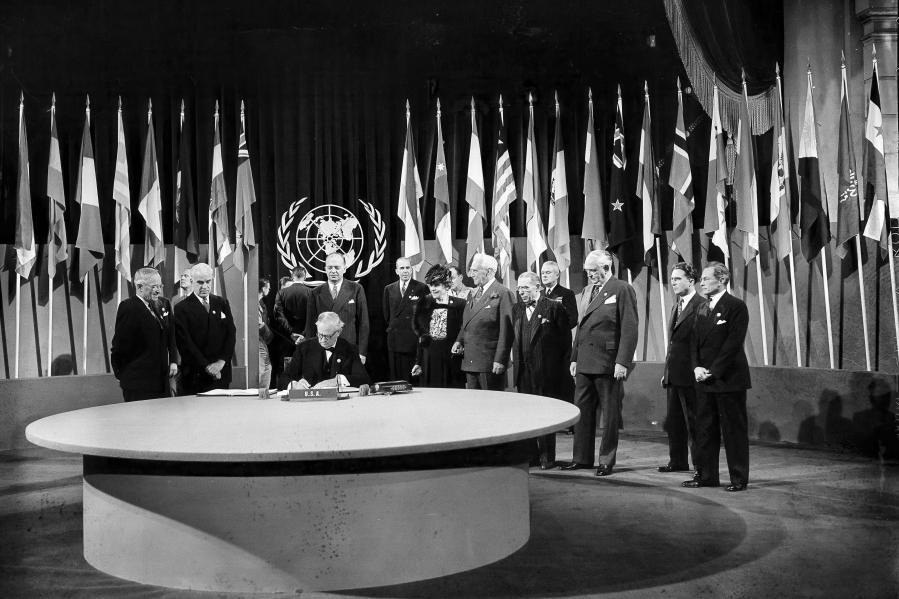
News
September 23, 2025
The UN must go ‘back to the future’ to meet today’s global challenges
What would today’s world look like without the U.N.? It seems we’re about to find out.
The United Nations, an organization founded in the aftermath of World War II to foster international cooperation and prevent future global conflicts, is facing an unprecedented crisis of relevance. The question on many minds is stark: What would today’s world look like without the U.N.? Some observers fear we are on the verge of finding out.
A growing chorus of voices is arguing that the UN is struggling to effectively address the complex and rapidly evolving challenges of the 21st century. From climate change and global pandemics to escalating geopolitical tensions and humanitarian crises, the world faces problems that demand swift, coordinated action. Yet, the UN often appears bogged down by bureaucratic processes, internal divisions, and a lack of decisive leadership.
The call for the UN to go "back to the future" isn't about simply reverting to past practices. Instead, it emphasizes the need to rediscover the foundational principles that guided the organization's creation – principles of collective security, multilateralism, and a commitment to solving global problems through diplomacy and cooperation. The idea is to adapt these core values to the present context, leveraging modern tools and innovative approaches to enhance the UN's effectiveness.
Critics point to the Security Council’s persistent gridlock, fueled by the veto power of its permanent members, as a major impediment to addressing pressing global issues. This paralysis undermines the UN's ability to respond decisively to conflicts and humanitarian emergencies, leading to frustration and a decline in its credibility.
Furthermore, some argue that the UN's structure, designed in a world vastly different from today, needs significant reform to better reflect the current global power dynamics. The rise of new economic and political powers, coupled with the growing influence of non-state actors, necessitates a re-evaluation of the UN's decision-making processes and representation.
The future of the UN hinges on its ability to adapt and demonstrate its value in a rapidly changing world. This requires a renewed commitment to its founding principles, a willingness to embrace innovation, and a fundamental reform of its structures and processes. If the UN fails to meet these challenges, the world risks drifting towards a more fragmented and unstable future, one where global problems are left unaddressed and the specter of conflict looms large.
A growing chorus of voices is arguing that the UN is struggling to effectively address the complex and rapidly evolving challenges of the 21st century. From climate change and global pandemics to escalating geopolitical tensions and humanitarian crises, the world faces problems that demand swift, coordinated action. Yet, the UN often appears bogged down by bureaucratic processes, internal divisions, and a lack of decisive leadership.
The call for the UN to go "back to the future" isn't about simply reverting to past practices. Instead, it emphasizes the need to rediscover the foundational principles that guided the organization's creation – principles of collective security, multilateralism, and a commitment to solving global problems through diplomacy and cooperation. The idea is to adapt these core values to the present context, leveraging modern tools and innovative approaches to enhance the UN's effectiveness.
Critics point to the Security Council’s persistent gridlock, fueled by the veto power of its permanent members, as a major impediment to addressing pressing global issues. This paralysis undermines the UN's ability to respond decisively to conflicts and humanitarian emergencies, leading to frustration and a decline in its credibility.
Furthermore, some argue that the UN's structure, designed in a world vastly different from today, needs significant reform to better reflect the current global power dynamics. The rise of new economic and political powers, coupled with the growing influence of non-state actors, necessitates a re-evaluation of the UN's decision-making processes and representation.
The future of the UN hinges on its ability to adapt and demonstrate its value in a rapidly changing world. This requires a renewed commitment to its founding principles, a willingness to embrace innovation, and a fundamental reform of its structures and processes. If the UN fails to meet these challenges, the world risks drifting towards a more fragmented and unstable future, one where global problems are left unaddressed and the specter of conflict looms large.
Category:
World